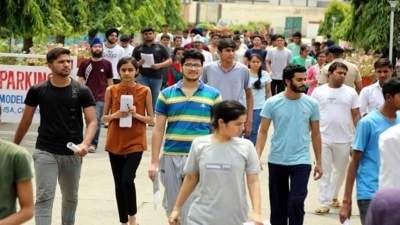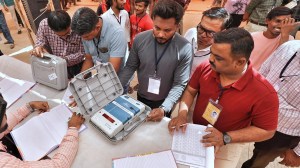- India
- International
Covid impact: Hyderabad’s oldest single-screen theatre fades into darkness
While the theatre used to record a monthly profit of anything below Rs 50,000, months of no-show have pushed them to mounting losses.
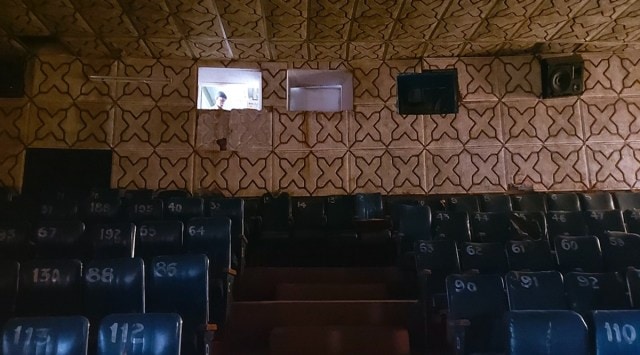 Inside view of the Yakut Mahal in Hyderabad.(Express Photo by Rahul V Pisharody)
Inside view of the Yakut Mahal in Hyderabad.(Express Photo by Rahul V Pisharody)The oldest single-screen movie theatre in Hyderabad, Yakut Mahal, which used a 1927-make projector imported from Chicago till a couple of years ago before film screening took a digital shift, may not bring characters alive on the big screen one more time. The pandemic-induced lockdown, the proprietors of the iconic theatre believe, was the last nail in the coffin.
Even as movie halls are now allowed to run shows with 100 per cent occupancy, the theatre management feels the operations may not be a viable option in the present scenario unless the government offers exhibitors like them a financial package to recuperate. On February 20, Yakut Mahal deluxe theatre, an important landmark in Yakutpura situated close to historic Charminar, will complete a year of no film screenings – a first in its 85 years of existence.
Even big players in the industry are suffering due to losses from months of shutdown and low footfall now, reasoned M.A Akhtar Sharfan, one of the ten siblings who manage the theatre now. “Despite years of losses, we kept the theatre running for the sake of people’s entertainment. Our history dates back to the Nizam’s era when nobilities and bureaucrats frequented the theatre just as the common folks did. But now, it looks like at least six months would pass by before the public starts flocking theatres like earlier,” says Akhtar, who is an advocate by profession.
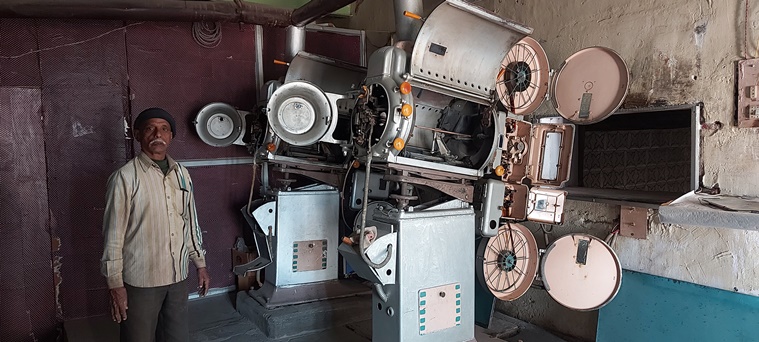 Aslam Chaush is one of the oldest employees of the Yakut Mahal theatre. (Express Photo by Rahul V Pisharody)
Aslam Chaush is one of the oldest employees of the Yakut Mahal theatre. (Express Photo by Rahul V Pisharody)
The theatre was set up in 1936 by Nawab Jafar Nawaz Jung with two “Peerless MagnaraC” high-intensity lamp projectors manufactured in 1927 by J.E.McAuley Manufacturing Company of Chicago. Mohd Abdul Salaam Sharfan later bought the theatre and now the family led by its oldest son M.A Rafeeq Sharfan owns the property.
Over the decades, the theatre did manage to stand the test of time when other single-screen theatres in the city made way for commercial as well as residential buildings. “I can say we started seeing the downward trend due to the popularity of cable TV networks in the late 1990s. First, it was the TV, and then came different forms of the internet which now has reached a stage of 4G and 5G, and of course, multiplex screens are everywhere,” said Akhtar’s older brother M.A Lateef Sharfan.

One of the oldest employees at the theatre, Aslam Chaush, who is in his seventies now, has lived all his life around the 581-seater movie house. He reminisces a houseful show of black-and-white movie ‘Malhar’ (1951) as one of his earliest cinema experiences at Yakut Mahal before he joined the theatre as a staff member in 1970. According to Aslam, Dilip Kumar’s ‘Aan’ (1952), ‘Mother India’ (1957), and ‘Ganga Jamuna’ (1961) ran houseful for weeks at the theatre. “It was so difficult to get tickets and people were ready to sit anywhere on the stairs, pathways, or floor to watch the movies. Amitabh’s ‘Amar Akbar Antony’ (1977), ‘Cooli’ (1983), and ‘Sharabi’ (1984) were major blockbusters. In the later years, such huge crowds were mostly seen during Salman Khan’s movies starting ‘Saajan’ (1991) to ‘Tere Naam’ (2003) and all the recent ones,” he recalled.
As times changed, the flat 35mm screen was changed to a 70mm cinemascope. Separate enclosures that existed for nobilities were removed. A partition wall from the 1930s that divided the balcony to create a separate section for women viewers was removed for a better cinematic experience. The theatre was further renovated with Air Conditioners, push-back seating, and sound-proof interiors in 2005. A little over 10 years later, the owners were forced to move digital and stop exhibiting using film reels. “But the charm and excitement of watching movies in theatres are not present anymore. Even before watching a film, people make up their mind from trailers, reviews, or online comments and feedback,” Lateef lamented.
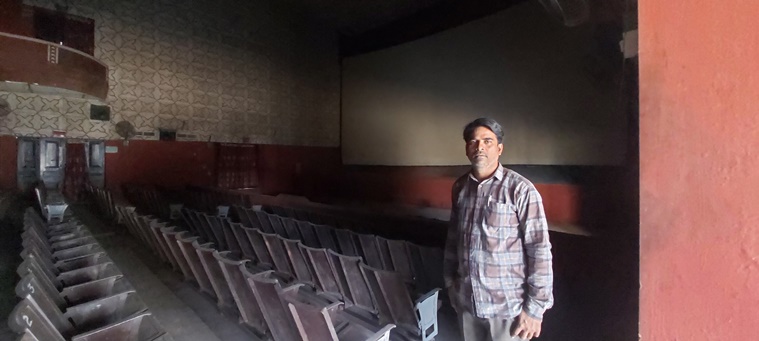 M.A Lateef Sharfan, one of the owners of Yakut Mahal theatre. (Express Photo by Rahul V Pisharody)
M.A Lateef Sharfan, one of the owners of Yakut Mahal theatre. (Express Photo by Rahul V Pisharody)
The pandemic inflicted huge losses on the theatre. While the theatre used to record a monthly profit of anything below Rs 50,000, months of no-show have pushed them to mounting losses. “The income was zero and we have had to pay the property tax, electricity charges, and maintenance. We paid full salaries to all our employees because they have been with us forever. Without some hand holding from the government, we won’t be able to open again,” he noted.
The plight of single-screen theatres is similar across the state. In Miryalaguda town of Nalgonda district, M Vijandar Reddy currently has an offer from a multinational corporation to convert his 44-year-old Venkateswara Theatre into an AC godown. “For a year’s lease, they are ready to give me Rs 8 lakh. If I run the theatre for a year, I will earn only Rs 4 lakh. My other theatre Nataraj is already demolished and a shopping complex is built in its place,” said Reddy. He is also the Treasurer of the Telugu Film Chamber of Commerce and the secretary of the Telangana Exhibitors Association, a trade union organisation of single-screen movie theatres’ owners.
He said nearly 30 of the total 480 single-screen theatres across Telangana have decided not to operate in the present conditions. “They have either given away their premises as godowns or committed the land for construction of apartments,” he stressed.
Earlier, Telangana chief minister K Chandrasekhar Rao had promised to waive electricity charges incurred by theatre owners during these months of shutdown and also allow flexible ticket pricing and the number of shows. Telangana State Film Chamber of Commerce president K Murali Mohan noted that many of their demands were yet to be addressed. The government, he hoped, will issue the official orders soon. “Given the pandemic, we are ready to take extra precaution in terms of sanitation. We hope to get maximum relief without burdening the public. We are hoping the government will address our concerns soon,” he said.
Apr 18: Latest News
- 01
- 02
- 03
- 04
- 05











